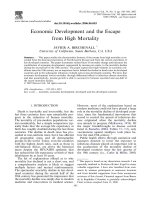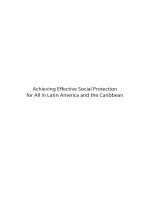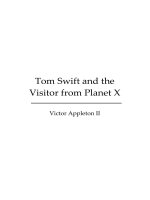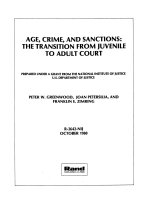The gentleman from indiana
Bạn đang xem bản rút gọn của tài liệu. Xem và tải ngay bản đầy đủ của tài liệu tại đây (1.13 MB, 245 trang )
ProjectGutenberg'sTheGentlemanFromIndiana,byBoothTarkington
ThiseBookisfortheuseofanyoneanywhereatnocostandwith
almostnorestrictionswhatsoever.Youmaycopyit,giveitawayor
re-useitunderthetermsoftheProjectGutenbergLicenseincluded
withthiseBookoronlineatwww.gutenberg.org
Title:TheGentlemanFromIndiana
Author:BoothTarkington
ReleaseDate:June16,2009[EBook#9659]
LastUpdated:March3,2018
Language:English
***STARTOFTHISPROJECTGUTENBERGEBOOKTHEGENTLEMANFROMINDIANA***
ProducedbyAnAnonymousVolunteer,andDavidWidger
THEGENTLEMANFROM
INDIANA
ByBoothTarkington
CONTENTS
CHAPTERI.THEYOUNGMANWHOCAMETOSTAY
CHAPTERII.THESTRANGELADY
CHAPTERIII.LONESOMENESS
CHAPTERIV.THEWALRUSANDTHECARPENTER
CHAPTER V. AT THE PASTURE BARS: ELDER-BUSHES
MAYHAVESTINGS
CHAPTERVI.JUNE
CHAPTERVII.MORNING:“SOMEINRAGSANDSOMEIN
TAGSANDSOMEINVELVET
CHAPTER VIII. GLAD AFTERNOON: THE GIRL BY THE
BLUETENT-POLE
CHAPTERIX.NIGHT:ITISBADLUCKTOSINGBEFORE
BREAKFAST
CHAPTERX.THECOURT-HOUSEBELL
CHAPTERXI.JOHNBROWN'SBODY
CHAPTERXII.JERRYTHETELLER
CHAPTERXIII.JAMESFISBEE
CHAPTERXIV.ARESCUE
CHAPTERXV.NETTLES
CHAPTERXVI.PRETTYMARQUISE
CHAPTERXVII.HELEN'STOAST
CHAPTERXVIII.THETREACHERYOFH.FISBEE
CHAPTERXIX.THEGREATHARKLESSCOMESHOME
CHAPTERI.THEYOUNGMANWHOCAMETO
STAY
There is a fertile stretch of flat lands in Indiana where unagrarian Eastern
travellers,glancingfromcar-windows,shudderandreturntheireyestointerior
upholstery,preferringeventheswayingcaparisonsofaPullmantothemonotony
without.Thelandscapeliesinterminablylevel:bleakinwinter,adesolateplain
ofmudandsnow; hotanddustyinsummer,initsflatlonesomeness,mileson
mileswithnotonecoolhillslopeawayfromthesun.Thepersistenttouristwho
seeks for signs of man in this sad expanse perceives a reckless amount of rail
fence; at intervals a large barn; and, here and there, man himself, incurious,
patient, slow, looking up from the fields apathetically as the Limited flies by.
Widelyseparatedfromeachotheraresmallframerailwaystations—sometimes
with no other building in sight, which indicates that somewhere behind the
adjacentwoodsafewshantiesandthincottagesaregroupedaboutacoupleof
brickstores.
Onthestationplatformstherearealwaystwoorthreewoodenpacking-boxes,
apparentlymarkedfortravel,buttheyaresacredfromdisturbanceandremainon
theplatformforever;possiblytherighttrainnevercomesalong.Theyserveto
enthrone a few station loafers, who look out from under their hat-brims at the
facesinthecar-windowswiththelanguidscornapermanentfixturealwayshas
foratransient,andthepityanAmericanfeelsforafellow-beingwhodoesnot
liveinhistown.Nowandthenthetrainpassesatownbuiltscatteringlyabouta
court-house,withamillortwohummingnearthetracks.Thisisacounty-seat,
andtheinhabitantsandthelocalpapersrefertoitconfidentlyas“ourcity.”The
heartoftheflatlandsisacentralareacalledCarlowCounty,andthecounty-seat
ofCarlowisatownunhappilynamedinhonorofitsfirstsettler,WilliamPlatt,
whochristeneditwithhisblood.Nativesofthisplacehavesometimesremarked,
easily, that their city had a population of from five to six thousand souls. It is
easytoforgivethemforsuchstatements;civicprideisavirtue.
ThesocialandbusinessenergyofPlattvilleconcentratesontheSquare.Here,
in summer-time, the gentlemen are wont to lounge from store to store in their
shirtsleeves;andherestoodtheold,red-brickcourt-house,looselyfencedina
shady grove of maple and elm—“slipp'ry ellum”—called the “Court-House
Yard.”Whenthesungrewtoohotforthedry-goodsboxwhittlersinfrontofthe
storesaroundtheSquareand theoccupants of thechairsin frontof thePalace
Hotelonthecorner,theywouldgoacrossanddrapethemselvesoverthecourthousefence,underthetrees,andleisurelycarvethereinitialsonthetopboard.
The farmers hitched their teams to the fence, for there were usually loafers
energetic enough to shout “Whoa!” if the flies worried the horses beyond
patience.Intheyard,amongsttheweedsandtall,unkeptgrass,chickensforaged
all day long; the fence was so low that the most matronly hen flew over with
propriety;andthereweregapsthataccommodatedthepassageofitinerantpigs.
Most of the latter, however, preferred the cool wallows of the less important
street corners. Here and there a big dog lay asleep in the middle of the road,
knowingwellthattheeasy-goingSamaritan,inhiscase,wouldpassbyonthe
otherside.
Onlyonestreetattainedtothedignityofaname—MainStreet,whichformed
the north side of the Square. In Carlow County, descriptive location is usually
accomplished by designating the adjacent, as, “Up at Bardlocks',” “Down by
Schofields',”“RightwhereHibbardslive,”“AcrostfromSol.Tibbs's,”or,“Other
sideofJones'sfield.”Inwinter,MainStreetwasaseriesoffrozengorgesland
hummocks;infallandspring,ariverofmud;insummer,acontinuingdustheap;
itwasthebeststreetinPlattville.
Thepeoplelivedhappily;and,whiletheworldwhirledonoutside,theywere
content with their own. It would have moved their surprise as much as their
indignation to hear themselves spoken of as a “secluded community”; for they
satupallnighttohearthevoteofNewYork,everycampaign.Oncewhenthe
PresidentvisitedRouen,seventymilesaway,therewereonlyfewbankrupts(and
not a baby amongst them) left in the deserted homes of Carlow County.
Everybodyhadadventures;almosteverybodysawthegreatman;andeverybody
wasgladtogetbackhomeagain.Itwasthelongestjourneysomeofthemever
set upon, and these, elated as they were over their travels, determined to think
twiceeretheywentthatfarfromhomeanothertime.
OnSaturdays,thefarmersenlivenedthecommercialatmosphereofPlattville;
and Miss Tibbs, the postmaster's sister and clerk, used to make a point of
walking up and down Main Street as often as possible, to get a thrill in the
realizationofsomepoeticalexpressionsthathauntedherpleasingly;phrasesshe
hademployedfrequentlyinherpoemsforthe“CarlowCountyHerald.”When
thirtyorfortycountrypeoplewerescatteredalongthesidewalksinfrontofthe
storesonMainStreet,shewouldwalkatnicelycalculatedanglestothedifferent
groupssoastoleaveasfewgapsaspossiblebetweenthefigures,makingthem
appearasnearasolidphalanxasshecould.Thenshewouldmurmurtoherself,
with the accent of soulful revel, “The thronged city streets,” and, “Within the
thronged city,” or, “Where the thronging crowds were swarming and the great
cathedralrose.”AlthoughshehadneverbeenbeyondCarlowandthebordering
counties in her life, all her poems were of city streets and bustling multitudes.
ShewasoneofthosewhohadbeenunabletojointheexcursiontoRouenwhen
thePresidentwasthere;butshehadlistenedavidlytoherfriends'descriptionsof
thecrowds.Beforethattimehermusehadbeensylvan,speakingof“Flow'rsof
May,”andhintingatthoughtsthatovercameherwhensherovedthewoodlands
thro'; but now the inspiration was become decidedly municipal and urban,
evidently reluctant to depart beyond the retail portions of a metropolis. Her
verses beginning, “O, my native city, bride of Hibbard's winding stream,”—
Hibbard'sCreekrunswestofPlattville,exceptintimeofdrought—“Whenthy
myriad lights are shining, and thy faces, like a dream, Go flitting down thy
sidewalks when their daily toil is done,” were pronounced, at the time of their
publication,thebestpoemthathadeverappearedinthe“Herald.”
This unlucky newspaper was a thorn in the side of every patriot of Carlow
County.Itwasapoorpaper;everybodyknewitwasapoorpaper;itwassopoor
thateverybodyadmitteditwasapoorpaper—worse,theneighboringcountyof
Amopossessedabetterpaper,the“AmoGazette.”The“CarlowCountyHerald”
was so everlastingly bad that Plattville people bent their heads bitterly and
admitted even to citizens of Amo that the “Gazette” was the better paper. The
“Herald”wasaweekly,issuedonSaturday;sometimesithungfireoverSunday
andappearedMondayevening.Intheirpride,theCarlowpeoplesupportedthe
“Herald” loyally and long; but finally subscriptions began to fall off and the
“Gazette”gainedthem.Itcametopassthatthe“Herald”missedfirealtogether
forseveralweeks;thenitcameoutfeebly,twosmalladvertisementsoccupying
the whole of the fourth page. It was breathing its last. The editor was a claycolored gentleman with a goatee, whose one surreptitious eye betokened both
indolence of disposition and a certain furtive shrewdness. He collected all the
outstandingsubscriptionshecould,onthemorningoftheissuejustmentioned,
and, thoughtfully neglecting several items on the other side of the ledger,
departedfromPlattvilleforever.
ThesameafternoonayoungmanfromtheEastalightedontheplatformofthe
railway station, north of the town, and, entering the rickety omnibus that
lingeredthere,seekingwhomitmightrattletodeafness,demandedtobedriven
to the Herald Building. It did not strike the driver that the newcomer was
preciselyagayyoungmanwhenheclimbedintotheomnibus;but,anhourlater,
as he stood in the doorway of the edifice he had indicated as his destination,
depression seemed to have settled into the marrow of his bones. Plattville was
instantly alert to the stranger's presence, and interesting conjectures were
hazardedalldaylongatthebackdoorofMartin'sDry-GoodsEmporium,where
alltheclerksfromthestoresaroundtheSquarecametoplaycheckersorlookon
atthegame.(Thiswastheclubduringtheday;intheeveningtheclubandthe
gameremovedtothedrug,book,andwall-paperstoreonthecorner.)Atsupper,
thenewarrivalandhisprobablepurposeswerediscussedovereverytableinthe
town. Upon inquiry, he had informed Judd Bennett, the driver of the omnibus,
that he had come to stay. Naturally, such a declaration caused a sensation, as
people did not come to Plattville to live, except through the inadvertency of
being born there. In addition, the young man's appearance and attire were
reported to be extraordinary. Many of the curious, among them most of the
marriageablefemalesoftheplace,tookoccasiontopassandrepassthesignof
the“CarlowCountyHerald”duringtheevening.
Meanwhile,thestrangerwasseatedinthedingyofficeupstairswithhishead
bowedlowonhisarms.Twilightstolethroughthedirtywindow-panesandfaded
intodarkness.Nightfilledtheroom.Hedidnotmove.Theyoungmanfromthe
Easthadboughtthe“Herald”fromanagent;hadboughtitwithouteverhaving
been within a hundred miles of Plattville. He had vastly overpaid for it.
Moreover,thepricehehadpaidforitwasallthemoneyhehadintheworld.
The next morning he went bitterly to work. He hired a compositor from
Rouen,ayoungmannamedParker,whosettypeallnightlongandhelpedhim
pursue advertisements all day. The citizens shook their heads pessimistically.
They had about given up the idea that the “Herald” could ever amount to
anything, and they betrayed an innocent, but caustic, doubt of ability in any
stranger.
One day the new editor left a note on his door; “Will return in fifteen
minutes.”
Mr. Rodney McCune, a politician from the neighboring county of Gaines,
happeningtobeinPlattvilleonanerrandtohishenchmen,foundthenote,and
wrotebeneaththemessagethescathinginquiry,“Why?”
Whenhediscoveredthisaddendum,theeditorsmiledforthefirsttimesince
his advent, and reported the incident in his next issue, using the rubric, “Why
Hasthe'Herald'ReturnedtoLife?”asatextforarousingeditorialon“honesty
inpolitics,”asubjectofwhichhealreadyknewsomething.Thepoliticaldistrict
to which Carlow belonged was governed by a limited number of gentlemen
whosewealthwaseverontheincrease;and“honestyinpolitics”wasastartling
conception to the minds of the passive and resigned voters, who discussed the
editorialonthestreetcornersandinthestores.Thenextweektherewasanother
editorial,personalandlocalinitsapplication,andtherebyitbecameevidentthat
thenewproprietorofthe“Herald”wasatheoristwhobelieved,ingeneral,thata
politician'shonorshouldnotbemerelyofthatmiddlinghealthyspeciesknown
as“honoramongstpoliticians”;and,inparticular,thatRodneyMcCuneshould
notreceivethenominationofhispartyforCongress.Now,Mr.McCunewasthe
undoubted dictator of the district, and his followers laughed at the stranger's
fantasticonset.
But the editor was not content with the word of print; he hired a horse and
rodeaboutthecountry,and(tohisownsurprise)heprovedtobeanadaptable
youngmanwhoenjoyedexercisewithapitchforktothefarmer'sprofitwhilethe
farmertalked.Hetalkedlittlehimself,butafterlisteninganhourorso,hewould
dropawordfromthesaddleasheleft;andthen,bysomesurprisingwizardry,
the farmer, thinking over the interview, decided there was some sense in what
that young fellow said, and grew curious to see what the young fellow had
furthertosayinthe“Herald.”
PoliticsistheonesubjectthatgoestothevitalsofeveryruralAmerican;anda
Hoosierwilltalkpoliticsafterheisdead.
Everybodyreadthecampaigneditorials,andfoundtheminteresting,although
therewasnoonewhodidnotperceivetheutterabsurdityofayoungstranger's
droppingintoCarlowandinvolvinghimselfinapartyfightagainstthebossof
thedistrict.Itwasentirelyapartyfight;for,bygraceofthelastgerrymander,the
nomination carried with it the certainty of election. A week before the
convention there came a provincial earthquake; the news passed from man to
man in awe-struck whispers—McCune had withdrawn his name, making the
hollowest of excuses to his cohorts. Nothing was known of the real reason for
his disordered retreat, beyond the fact that he had been in Plattville on the
morningbeforehiswithdrawalandhadissuedfromavisittothe“Herald”office
inastateofpalsy.Mr.Parker,theRouenprinter,hadbeenpresentatthecloseof
the interview; but he held his peace at the command of his employer. He had
been called into the sanctum, and had found McCune, white and shaking,
leaningonthedesk.
“Parker,”saidtheeditor,exhibitingabundleofpapersheheldinhishand,“I
wantyoutowitnessaverbalcontractbetweenMr.McCuneandmyself.These
papersareanaffidavitandcopiesofsomerecordsofastreet-carcompanywhich
obtainedacharterwhileMrMcCunewasintheStatelegislature.Theyweresent
tomebyamanIdonotknow,ananonymousfriendofMr.McCune's;infact,a
friendheseemstohavelost.Onconsiderationofournotprintingthesepapers,
Mr.McCuneagreestoretirefrompoliticsforgood.Youunderstand,ifheever
liftshisheadagain,politically,Wepublishthem,andthecourtswilldotherest.
Now,incaseanythingshouldhappentome——”
“Somethingwillhappentoyou,allright,”brokeoutMcCune.“Youcanbank
onthat,youblack——”
“Come,” the editor interrupted, not unpleasantly “why should there be
anythingpersonal,inallthis?Idon'trecognizeyouasmyprivateenemy—notat
all; and I think you are getting off rather easily; aren't you? You stay out of
politics,andeverythingwillbecomfortable.Yououghtnevertohavebeeninit,
yousee.It'samistakenottokeepsquare,becauseinthelongrunsomebodyis
suretogiveyouaway—likethefellowwhosentmethese.Youpromisetohold
toastrictlyprivatelife?”
“You'reatraitortotheparty,”groanedtheother,“butyouonlywait——”
Theeditorsmiledsadly.“Waitnothing.Don'tthreaten,man.Gohometoyour
wife.I'llgiveyouthreetooneshe'llbegladyouareoutofit.”
“I'llgiveyouthreetoone,”saidMcCune,“thattheWhiteCapswillgetyouif
youstayinCarlow.Youwanttolookoutforyourself,Itellyou,mysmartboy!”
“Good-day, Mr. McCune,” was the answer. “Let me have your note of
withdrawal before you leave town this afternoon.” The young man paused a
moment, then extended his hand, as he said: “Shake hands, won't you? I—I
haven'tmeanttobetoohardonyou.Ihopethingswillseemeasierandgayerto
you before long; and if—if anything should turn up that I can do for you in a
privateway,I'llbeveryglad,youknow.Good-by.”
Thesoundofthe“Herald's”victorywentovertheState.Thepapercameout
regularly. The townsfolk bought it and the farmers drove in for it. Old
subscriberscameback.Oldadvertisersrenewed.The“Herald”begantosellin
Amo, and Gaines County people subscribed. Carlow folk held up their heads
when journalism was mentioned. Presently the “Herald” announced a news
connectionwithRouen,andwiththat,andtheaidof“patentinsides,”beganan
era of three issues a week, appearing on Tuesdays, Thursdays, and Saturdays.
ThePlattvilleBrassBandserenadedtheeditor.
During the second month of the new regime of the “Herald,” the working
force of the paper received an addition. One night the editor found some
barroom loafers tormenting a patriarchal old man who had a magnificent head
andagrandwhitebeard.Hehadbeenthrownoutofasaloon,andhewasdrunk
withthedrunkennessofthreeweekssteadypouring.Heproppedhimselfagainst
awallandreprovedhistormentorsinLatin.“I'mwalkingyourway,Mr.Fisbee,”
remarkedthejournalist,hookinghisarmintotheoldman's.“Supposeweleave
ourfriendshereandgohome?”
Mr.Fisbeewastheoneinhabitantofthetownwhohadanunknownpast;no
one knew more about him than that he had been connected with a university
somewhere, and had travelled in unheard-of countries before he came to
Plattville.Aglamourofromancewasthrownabouthimbythegossips,towhom
he ever proved a fund of delightful speculation. There was a dark, portentous
secret in his life, it was agreed; an opinion not too well confirmed by the old
man'sappearance.Hisfineeyeshadapathetichabitofwanderingtothehorizon
inaquestioningfashionthathadaqueersortofhopelessnessinit,asifhisquest
wereonefortheHolyGrail,perhaps;andhisexpressionwasmild,vague,and
sad.Hehadalookofraceandblood;andyet,atthefirstglance,onesawthathe
was lost in dreams, and one guessed that the dreams would never be of great
practicabilityintheirapplication.SomesuchimpressionofFisbeewasprobably
whatcausedtheeditorofthe“Herald”tonicknamehim(inhisownmind)“The
WhiteKnight,”andtoconceiveastrong,ifwhimsical,fancyforhim.
Old Fisbee had come (from nobody knew where) to Plattville to teach, and
hadbeenprincipaloftheHighSchoolfortenyears,instructinghispupilsaftera
peculiar fashion of his own, neglecting the ordinary courses of High School
instructiontolectureonarchaeologytothedumfoundedscholars;growingyear
byyearmoreforgetfulandabsent,lostinhisfewbooksandhisownreflections,
until,thoughundeniablyascholar,hehadbeendischargedforincompetency.He
wasold;hehadnomoneyandnowaytomakemoney;hecouldfindnothingto
do.Theblowhadseemedtodazehimforatime;thenhebegantodropinatthe
hotel bar, where Wilkerson, the professional drunkard, favored him with his
society.Theoldmanunderstood;heknewitwasthebeginningoftheend.He
soldhisbooksinordertocontinuehiscreditatthePalacebar,andonceortwice,
unabletoproceedtohisowndwelling,spentthenightinalumberyard,piloted
thitherbythehardierveteran,Wilkerson.
Themorningaftertheeditortookhimhome,Fisbeeappearedatthe“Herald”
office in a new hat and a decent suit of black. He had received his salary in
advance, his books had been repurchased, and he had become the reportorial
staffofthe“CarlowCountyHerald”;also,hewastowritevarioustreatisesfor
thepaper.Forthefirstfewevenings,whenhestartedhomefromtheoffice,his
chief walked with him, chatting heartily, until they had passed the Palace bar.
ButFisbee'sredemptionwascomplete.
Theoldmanhadadaughter.WhenshecametoPlattville,hetoldherwhatthe
editorofthe“Herald”haddoneforhim.
Thejournalistkeptsteadilyat hiswork;and,astimewenton,thebitterness
his predecessor's swindle had left him passed away. But his loneliness and a
senseofdefeatgrewanddeepened.Whenthevistasoftheworldhadopenedto
hisfirstyouth,hehadnotthoughttospendhislifeinsuchaplaceasPlattville;
but he found himself doing it, and it was no great happiness to him that the
congressionalrepresentativeofthedistrict,thegentlemanwhomthe“Herald's”
oppositiontoMcCunehadsenttoWashington,cametodependonhisinfluence
forrenomination;nordidtherealizationthattheeditorofthe“CarlowCounty
Herald” had come to be McCune's successor as political dictator produce a
perceptiblyenliveningeffectontheyoungman.Theyearsdriftedvery slowly,
andtohimitseemedtheywentbywhilehestoodfarasideandcouldnoteven
seethemmove.Hedidnotconsiderthelifeheledanexcitingone;buttheother
citizensofCarlowdidwhenheundertookawaragainstthe“WhiteCaps.”The
natives were much more afraid of the “White Caps” than he was; they knew
moreaboutthemandunderstoodthembetterthanhedid.
CHAPTERII.THESTRANGELADY
ITwasJune.Fromthepatentinnercolumnsofthe“CarlowCountyHerald”
might be gleaned the information (enlivened by cuts of duchesses) that the
Londonseasonhadreachedahighpointofgaiety;andthat,althoughtheweather
hadgrown inauspiciouslywarm,there wassufficientgossipforthethoughtful.
TotheraptmindofMissSelinaTibbscameadeliciousmomentofcomparison:
preciselythesameconditionsprevailedinPlattville.
NotundulymightMissSelinalaythisflatteringunctiontohersoul,andwell
mightthe“Herald”declarethat“Carloweventswerecrowdingthickandfast.”
The congressional representative of the district was to deliver a lecture at the
court-house;acircuswasapproachingthecounty-seat,anditsglorieswouldbe
exhibited “rain or shine”; the court had cleared up the docket by sitting to
unseemly hours of the night, even until ten o'clock—one farmer witness had
fallen asleep while deposing that he “had knowed this man Hender some
eighteen year”—and, as excitements come indeed when they do come, and it
seldom rains but it pours, the identical afternoon of the lecture a strange lady
descendedfromtheRouenAccommodationandwasgreetedontheplatformby
thewealthiestcitizenofthecounty.JudgeBriscoe,andhisdaughter,Minnie,and
(whatstirredwondertoanitchalmostbeyondendurance)Mr.Fisbee!andthey
thendrovethroughtownonthewaytotheBriscoemansion,allfour,apparently,
in a fluster of pleasure and exhilaration, the strange lady engaged in earnest
conversationwithMr.Fisbeeonthebackseat.
JuddBennetthadhadthebeststareather,but,asheimmediatelyfellintoa
dreamy and absent state, little satisfaction could be got from him, merely an
exasperating statement that the stranger seemed to have a kind of new look to
her. However, by means of Miss Mildy Upton, a domestic of the Briscoe
household,thecommunitywasgivensomethingalittlemoredefinite.Thelady's
namewasSherwood;shelivedinRouen;andshehadknownMissBriscoeatthe
easternschoolthelatterhadattended(tothefeverishagitationofPlattville)three
years before; but Mildy confessed her inadequacy in the matter of Mr. Fisbee.
Hehaddrivenupinthebuckboardwiththeothersandevidentlyexpectedtostay
for supper Mr. Tibbs, the postmaster (it was to the postoffice that Miss Upton
broughtherinformation)suggested,asapossibleexplanation,thattheladywas
so learned that the Briscoes had invited Fisbee on the ground of his being the
only person in Plattville they esteemed wise enough to converse with her; but
Miss Tibbs wrecked her brother's theory by mentioning the name of Fisbee's
chief.
“Yousee,Solomon,”shesagaciouslyobserved,“ifthatweretrue,theywould
haveinvitedhim,insteadofMr.Fisbee,andIwishtheyhad.Heisn'ttroubled
withmalaria,andyetthelongerhelivesherethesallower-lookingandsadderlookinghegets.Ithinkthecompanyofalovelystrangermightbeofgreatcheer
to his heart, and it will be interesting to witness the meeting between them. It
maybe,”addedthepoetess,“thattheyhavealreadymet,onhistravelsbeforehe
settledhere.Itmaybethattheyareoldfriends—orevenmore.”
“Thenwhat,”returnedherbrother,“whatishedoin'settin'upinhisofficeall
afternoon with ink on his forehead, while Fisbee goes out ridin' with her and
staysforsupperafterwerds?”
Although the problem of Fisbee's attendance remained a mere maze of
hopelessspeculation,MildyhadbeenpresentattheopeningofMissSherwood's
trunk, and here was matter for the keen consideration of the ladies, at least.
Thoughtfulconversationsinregardtohatsandliningstookplaceacrossfences
andoncornersoftheSquarethatafternoon;andmanygentlemenwondered(in
wise silence) why their spouses were absent-minded and brooded during the
eveningmeal.
Athalf-pastseven,theHon.KedgeHallowayofAmodeliveredhimselfofhis
lecture; “The Past and Present. What we may Glean from Them, and Their
InfluenceontheFuture.”Atseventhecourt-roomwascrowded,andMissTibbs,
seated on the platform (reserved for prominent citizens), viewed the expectant
throngwithrapture.Itispossiblethatshewouldhaveconfessedtowitnessinga
seaoffaces,butitismoreprobablethatsheviewedtheexpectantthrong.The
thermometerstoodateighty-sevendegreesandtherewasarustleofincessantly
movingpalm-leaffansas,rowbyrow,theiryellowsidestwinkledinthelightof
eight oil lamps. The stouter ladies wielded their fans with vigor. There were
some very pretty faces in Mr. Halloway's audience, but it is a peculiarity of
Plattvillethatmostofthosefemaleswhodonotinclinetostoutnessinclinefarin
the opposite direction, and the lean ladies naturally suffered less from the
temperaturethantheirsisters.Theshornlambiscaredfor,butoftenthereseems
the intention to impart a moral in the refusal of Providence to temper warm
weathertothefull-bodied.
OldTomMartinexpressedastrongconsciousnessofsuchintentionwhenhe
observedtotheshockedMissSelina,asMr.BillSnoddy,thestoutestcitizenof
the county, waddled abnormally up the aisle: “The Almighty must be gittin” a
heapoffunoutofBillSnoddyto-night.”
“Oh,Mr.Martin!”exclaimedMissTibbs,flutteringathisirreverence.
“Why, you would yourself. Miss Seliny,” returned old Tom. Mr. Martin
always spoke in one key, never altering the pitch of his high, dry, unctuous
drawl,though,whenhispurposewasmorethanordinarilyhumorous,hisvoice
assumedashadeofmelancholy.Nowandthenhemeditativelypassedhisfingers
throughhisgraybeard,whichfollowedthelineofhisjaw,leavinghisupperlip
andmostofhischinsmooth-shaven.“Didyoueverreasonoutwhyfolkslaugh
somuchatfatpeople?”hecontinued.“No,ma'am.Neither'danybodyelse.”
“Whyisit,Mr.Martin?”askedMissSelina.
“It'sliketheCreator'ssayin','Lettherebelight.'Hesays,'Letladiesbelovely
—'”(MissTibbsbowed)—“and'Letmen-folksbehonest—sometimes;'and,'Let
fatpeoplebehelduptoridiculetilltheyfalloff.'Youcan'ttellwhyitis;itwas
jestordainedthat-a-way.”
The room was so crowded that the juvenile portion of the assemblage was
ensconced in the windows. Strange to say, the youth of Plattville were not
presentunderprotest,astheirfellowsofametropoliswouldhavebeen,lectures
beingwellunderstoodbytheyoungofgreatcitiestohaveinstructivetendencies.
The boys came to-night because they insisted upon coming. It was an event.
Some of them had made sacrifices to come, enduring even the agony (next to
hair-cutting in suffering) of having their ears washed. Conscious of parental
eyes, they fronted the public with boyhood's professional expressionlessness,
though they communicated with each other aside in a cipher-language of their
own, and each group was a hot-bed of furtive gossip and sarcastic comment.
Seatedinthewindows,theykeptoutwhatsmallbreathofairmightotherwise
havestolenintocomforttheaudience.
Their elders sat patiently dripping with perspiration, most of the gentlemen
undergoing the unusual garniture of stiffly-starched collars, those who had not
cultivated chin beards to obviate such arduous necessities of pomp and state,
hardly bearing up under the added anxiety of cravats. However, they sat
outwardly meek under the yoke; nearly all of them seeking a quiet solace of
tobacco—not that they smoked; Heaven and the gallantry of Carlow County
forbid—norwerethereanywherevisibletokensofthecomfortingministrations
ofnicotinetoviolatetheeyeofetiquette.ItisanartofPlattville.
Suddenly there was a hum and a stir and a buzz of whispering in the room.
Two gray old men and two pretty young women passed up the aisle to the
platform. One old man was stalwart and ruddy, with a cordial eye and a
handsome,smooth-shaven,bigface.Theotherwasbentandtrembled slightly;
his face was very white; he had a fine high brow, deeply lined, the brow of a
scholar,andagrandlyflowingwhitebeardthatcoveredhischest,thebeardofa
patriarch. One of the young women was tall and had the rosy cheeks and
pleasanteyesofherfather,whoprecededher.Theotherwasthestrangelady.
Auniversalperturbationfollowedherprogressuptheaisle,ifshehadknown
it.Shewassmallandfair,verydaintilyandbeautifullymade;aprettyMarquise
whose head Greuze should have painted. Mrs. Columbus Landis, wife of the
proprietorofthePalaceHotel,conferringwithaladyinthenextseat,appliedan
over-burdenedadjective:“Itain'tsomuchshe'shan'some,thoughsheis,that—
but don't you notice she's got a kind of smart look to her? Her bein' so teeny,
kind of makes it more so, somehow, too.” What stunned the gossips of the
windowstoawedadmiration,however,wastheunconcernedandstoicalfashion
in which she wore a long bodkin straight through her head. It seemed a large
sacrificemerelytomakesureone'shatremainedinplace.
Thepartytookseatsalittletotheleftandrearofthelecturer'stable,andfaced
theaudience.Thestrangeladychattedgailywiththeotherthree,apparentlyas
unconsciousofthemultitudeofeyesfixeduponherasthegazerswereinnocent
ofrudeintent.TherewereprettyyoungwomeninPlattville;MinnieBriscoewas
theprettiest,and,asthelocalglassoffashionreflected,“thestylishest”;butthis
girl was different, somehow, in a way the critics were puzzled to discover—
different,fromthesparkleofhereyesandthecrownofhertrimsailorhat,tothe
edgeofhersnowyduckskirt.
Judd Bennett sighed a sigh that was heard in every corner of the room. As
everybodyimmediatelyturnedtolookathim,hegotupandwentout.
IthadlongbeenajocosefictionofMr.Martin,whowasawidowerofthirty
years' standing, that he and the gifted authoress by his side were in a state of
courtship.Nowhebenthisruggedheadtowardhertowhisper:“Ineverthought
toseethedayyou'dhavearivalinmyaffections.MissSeliny,butyonderlooks
likeit.IreckonI'llhavetogouptoBenTinkle'sandbuythatfancyvesthe'shad
instockthislasttwelveyearormore.Willyoutakemebackwhenshe'sleftthe
cityagain;MissSeliny?”hedrawled.“Iexpect,maybe,MissSherwoodisoneof
theseheresummergirls.I'veheardof'embutIneverseeonebefore.Youbetter
takewarningandwatchme—Fisbeewon'thavenoclearfieldfromnowon.”
The stranger leaned across to speak to Miss Briscoe and her sleeve touched
theleftshoulderoftheoldmanwiththepatriarchalwhitebeard.Amomentlater
heputhisrighthandtothatshoulderandgentlymoveditupanddownwitha
caressingmotionovertheshabbyblackbroadclothhergarmenthadtouched.
“Look at that old Fisbee!” exclaimed Mr. Martin, affecting indignation.
“Neverbe'nhalfassprucedupandwideawakeinallhislife.He'sprob'lygot
hertolistentohimonthedecorationsofNineveh—it'smybeliefhewasthere
whenitwasdestroyed.Well,ifIcan'tcuthimoutwe'llgetourrespectedyoung
friendofthe'Herald'todoit.”
“Sh!”returnedMissTibbs.“Hereheis.”
Theseatsupontheplatformwerealloccupied,exceptthetwoforemostones
inthecentre(oneoneachsideofalittletablewithalamp,apitcherofice-water,
and a glass) reserved for the lecturer and the gentleman who was to introduce
him. Steps were audible in the hall, and every one turned to watch the door,
wherethedistinguishedpairnowmadetheirappearanceinahushofexpectation
overwhichthebeatingofthe fansaloneprevailed.TheHon.KedgeHalloway
wasoneofthegleanersoftheflesh-pots,himself,andhemarchedintotheroom
unostentatiously mopping his shining expanse of brow with a figured
handkerchief. He was a person of solemn appearance; a fat gold watch-chain
whichcurvedacrosshisponderousfront,addingmysteriouslytohisgravity.At
his side strolled a very tall, thin, rather stooping—though broad-shouldered—
rathershabbyyoungmanwithasallow,melancholyfaceanddeep-seteyesthat
lookedtired.Whentheywereseated,theoratorlookedoverhisaudienceslowly
andwithanincomparablecalm;then,asisalwaysdone,heandthemelancholy
youngmanexchangedwhispersforafewmoments.Afterthistherewasapause,
attheendofwhichthelatterroseandannouncedthatitwashispleasureandhis
privilegetointroduce,thatevening,agentlemanwhoneedednointroductionto
that assemblage. What citizen of Carlow needed an introduction, asked the
speaker, to the orator they had applauded in the campaigns of the last twenty
years,thestatesmanauthoroftheHallowayBill,themosthonoredcitizenofthe
neighboring and flourishing county and city of Amo? And, the speaker would
say,thatiftherewereonethingthecitizensofCarlowcouldbeheldtoenvythe
citizens of Amo, it was the Honorable Kedge Halloway, the thinker, to whose
widely-knownpapertheywereabouttohavethepleasureandimprovementof
listening.
Theintroductionwassovehementlyapplaudedthat,hadtherebeenpresenta
personconnectedwiththetheatricalprofession,hemighthavebeennervousfor
feartheintroducerhadpreparednoencore.“Kedgeistoosmarttotakeitallto
himself,” commented Mr. Martin. “He knows it's half account of the man that
saidit.”
He was not mistaken. Mr. Halloway had learned a certain perceptiveness on
thestump.Restingonehanduponhisunfoldednotesuponthetable,heturned
towardthemelancholyyoungman(whohadsubsidedintothesmallofhisback
inhischair)and,afterclearinghisthroat,observedwithsuddenvehemencethat
hemustthankhisgiftedfriendforhisflatteringremarks,butthatwhenhesaid
that Carlow envied Amo a Halloway, it must be replied that Amo grudged no
glorytohersistercountyofCarlow,but,ifAmocouldfindenvyinherheartit
wouldbebecauseCarlowpossessedapapersosterling,soupright,sobrilliant,
soenterprisingasthe“CarlowCountyHerald,”andajournalistsotalented,so
gifted,soenergetic,sofearless,asitseditor.
The gentleman referred to showed very faint appreciation of these ringing
compliments. There was a lamp on the table beside him, against which, to the
viewofMissSherwoodofRouen,hisfacewassilhouetted,andveryrarelyhad
it been her lot to see a man look less enthusiastic under public and favorable
comment of himself. She wondered if he, also, remembered the Muggleton
cricketmatchandthesubsequentdinneroratory.
Thelectureproceeded.Theoratorwingedawaytosoaryheightswithgestures
sovigorousastocauseadmirationforhispluckinmakinguseofthemonsucha
night; the perspiration streamed down his face, his neck grew purple, and he
dared the very face of apoplexy, binding his auditors with a double spell. It is
truethatlongbeforetheperorationthewindowswereemptyandtheboyswere
eatingstolen,unripefruitintheorchardsofthelisteners.Thethievesweresure
ofanalibi.
The Hon. Mr. Halloway reached a logical conclusion which convinced even
the combative and unwilling that the present depends largely upon the past,
whilethefuturewillbedetermined,forthemostpart,bytheconditionsofthe
present. “The future,” he cried, leaning forward with an expression of solemn
warning, “The future is in our own hands, ladies and gentlemen of the city of
Plattville.Isitnotso?Wewillfinditso.Turnitoverinyourminds.”Heleaned
backward and folded his hands benevolently on his stomach and said in a
searching whisper; “Ponder it.” He waited for them to ponder it, and little Mr.
Swanter,thedruggistandbookseller,whopridedhimselfonhispolitenessand
whowasseateddirectlyinfront,scratchedhisheadandknithisbrowstoshow
thathewasponderingit.Thestillnesswasintense;thefansceasedtobeat;Mr.
Snoddycouldbeheardbreathingdangerously.Mr.Swanterwasconsideringthe
advisabilityofdrawingapencilfromhispocketandfiguringonituponhiscuff,
whensuddenly,withtheenergyofawhirlwind,thelecturerthrewouthisarms
totheirfullestextentandroared:“Itisafact!Itiscarvenonstoneinthegloomy
cavernsofTIME.ItiswritinFIREontheimperishablewallsofFate!”
Aftertheoutburst,hisvoicesankwithstartlingrapiditytoatoneofhoneyed
confidence,andhewaggedaninvitingforefingeratMr.Snoddy,whoopenedhis
mouth.“Shallwetakeanexample?Notfromthemarvellous,myfriends;letus
seek an illustration from the ordinary. Is that not better? One familiar to the
humblestofus.Onewecanallcomprehend.Onefromourevery-daylife.One
whichwillinteresteventheyoung.Yes.Thecommonhouse-fly.Onawindowsill we place a bit of fly-paper, and contiguous to it, a flower upon which the
happy insect likes to feed and rest. The little fly approaches. See, he hovers
betweenthetwo.Oneisafataltrap,anambuscade,andtheotherasafeharbor
andaninnocuoushaven.Butmysteryallureshim.Hepoises,undecided.Thatis
the present. That, my friends, is the Present! What will he do? WHAT will he
do?WhatwillheDO?Memoriesofthepastarewhisperingtohim:'Choosethe
flower.Lightontheposy.'Hereweclearlyseetheinfluenceofthepastuponthe
present. But, to employ a figure of speech, the fly-paper beckons to the insect
toothsomely,and,thinkshe;'ShallIgiveitatry?ShallI?ShallIgiveitatry?'
The future is in his own hands to make or unmake. The past, the voice of
Providence, has counselled him: 'Leave it alone, leave it alone, little fly. Go
away from there.' Does he heed the warning? Does he heed it, ladies and
gentlemen?Doeshe?Ah,no!Hespringsintotheair,decidesbetweenthetwo
attractions,oneofthem,sodeadlytohisinterestsand—dropsuponthefly-paper
toperishmiserably!Thefutureisinhishandsnolonger.Wemustlieuponthe
bedthatwehavemade,norcanProvidencechangeitsunalterabledecrees.”
Afterthetragedy,theoratortookaswallowofwater,moppedhisbrowwith
the figured handkerchief and announced that a new point herewith presented
itselfforconsideration.Theaudiencesankbackwithagaspofreleasefromthe
strain of attention. Minnie Briscoe, leaning back, breathless like the others,
becameconsciousthatatremoragitatedhervisitor.MissSherwoodhadbenther
headbehindtheshelterofthejudge'sbroadshoulders;wasshakingslightlyand
hadcoveredherfacewithherhands.
“What is it, Helen?” whispered Miss Briscoe, anxiously. “What is it? Is
somethingthematter?”
“Nothing. Nothing, dear.” She dropped her hands from her face. Her cheeks
weredeepcrimson,andshebitherlipwithdetermination.
“Oh,butthereis!Why,you'vetearsinyoureyes.Areyoufaint?Whatisit?”
“Itisonly—only——”MissSherwoodchoked,thencastaswiftglanceatthe
profile of the melancholy young man. The perfectly dismal decorum of this
gentlemanseemedtoinspirehertomaintainherowngravity.“Itisonlythatit
seemed such a pity about that fly,” she explained. From where they sat the
journalistic silhouette was plainly visible, and both Fisbee and Miss Sherwood
lookedtowarditoften,theformerwiththewistful,apologeticfidelityonesees
intheeyesofanoldsetterwatchinghismaster.
Whenthelecturewasovermanyoftheaudiencepressedforwardtoshakethe
Hon. Mr. Halloway's hand. Tom Martin hooked his arm in that of the sallow
gentlemanandpassedoutwithhim.
“Mighty humanizin' view Kedge took of that there insect,” remarked Mr.
Martin. “I don't recollect I ever heard of no mournfuller error than that'n. I
noticed you spoke of Halloway as a 'thinker,' without mentioning what kind. I
didn'tknow,before,thatyouwereascautiousamanasthat.”
“Doesyoursatirefindnothingsacred,Martin?”returnedtheother,“noteven
theHonorableKedgeHalloway?”
“Iwouldn'tpresume,”repliedoldTom,“tomakelightofthecatastrophethat
overtook the heedless fly. When Halloway went on to other subjects I was so
busypicturin'thelastmomentsofthatclosin'life,stuckthereinthefly-paper,I
couldn't listen to him. But there's no use dwellin' on a sorrow we can't help.
Lookatthemoon;it'sfullenoughtocheerusup.”Theyhademergedfromthe
court-house and paused on the street as the stream of townsfolk divided and
passedbythemtotakedifferentroutesleadingfromtheSquare.Notfaraway,
some people were getting into a buckboard. Fisbee and Miss Sherwood were
alreadyontherearseat.
“Who'swithhim,to-night,Mr.Fisbee?”askedJudgeBriscoeinalowvoice.
“Noone.Heisgoingdirectlytotheoffice.To-morrowisThursday,oneofour
daysofpublication.”
“Oh, then it's all right. Climb in, Minnie, we're waiting for you.” The judge
offeredhishandtohisdaughter.
“Inamoment,father,”sheanswered.“I'mgoingtoaskhimtocall,”shesaid
totheothergirl.
“Butwon'the—”
MissBriscoelaughed.“Henevercomestoseeme!”Shewalkedovertowhere
Martin and the young man were looking up at the moon, and addressed the
journalist.
“I've been trying to get a chance to speak to you for a week,” she said,
offering him her hand; “I wanted to tell you I had a friend coming to visit me
Won'tyoucometoseeus?She'shere.”
Theyoungmanbowed.“Thankyou,”heanswered.“Thankyou,verymuch.I
shall be very glad.” His tone had the meaningless quality of perfunctory
courtesy;MissBriscoedetectedonlythecourtesy;butthestrangeladymarked
thelackofintentioninhiswords.
“Don'tyouincludeme,Minnie?”inquiredMrMartin,plaintively.“I'lltrynot
tobetoofascinatin',soastogiveouryoungfriendashow.Itwasloveatfirst
sightwithme.IgiveMissSelinywarningsoonasyourfolkscomeinandIgota
goodlookatthelady.”
As the buckboard drove away, Miss Sherwood, who had been gazing
steadfastlyatthetwofiguresstillstandinginthestreet,thetallungainlyoldone,
and the taller, loosely-held young one (he had not turned to look at her)
withdrew her eyes from them, bent them seriously upon Fisbee, and asked:
“Whatdidyoumeanwhenyousaidnoonewaswithhimto-night?”
“Thatnoonewaswatchinghim,”heanswered.
“Watchinghim?Idon'tunderstand.”
“Yes;hehasbeenshotatfromthewoodsatnightand——”
Thegirlshivered.“Butwhowatcheshim?”
“Theyoungmenofthetown.Hehasahabitoftakinglongwalksafterdark,
and he is heedless of all remonstrance. He laughs at the idea of curtailing the
limit of his strolls or keeping within the town when night has fallen; so the
young men have organized a guard for him, and every evening one of them
follows him until he goes to the office to work for the night. It is a different
youngmaneveryevening,andthewatcherfollowsatadistancesothathedoes
notsuspect.”
“Buthowmanypeopleknowofthisarrangement?”
“NearlyeveryoneinthecountyexcepttheCross-Roadspeople,thoughitis
notimprobablethattheyhavediscoveredit.”
“Andhasnoonetoldhim”
“No;itwouldannoyhim;hewouldnotallowittocontinue.Hewillnoteven
armhimself.”
“They follow and watch him night after night, and every one knows and no
onetellshim?Oh,Imustsay,”criedthegirl,“Ithinkthesearegoodpeople.”
The stalwart old man on the front seat shook out the reins and whined the
whipoverhisroans'backs.“TheyarethepeopleofyourStateandmine.Miss
Sherwood,”hesaidinhisheartyvoice,“thebestpeopleinGod'sworld—andI'm
notrunningforCongress,either!”
“ButhowabouttheSix-Cross-Roadspeople,father?”askedMinnie.
“We'll wipe them clean out some day,” answered her father—“possibly
judicially,possibly——”
“Surelyjudiciously?”suggestedMissSherwood.
“Ifyoucaretoseewhatabadsettlementlookslike,we'lldrivethroughthere
to-morrow—bydaylight,”saidBriscoe.“Eventhedoctordoesn'tinsistonbeing
inthatneighborhoodafterdark.TheyaretryingtheirbesttogetHarkless,andif
theydo——”
“Iftheydo!”repeatedMissSherwood.SheclaspedFisbee'shandgently.His
eyesshoneandhetouchedherfingerswithastrange,shyreverence.
“Youwillmeethimto-morrow,”hesaid.
Shelaughedandpressedhishand.“I'mafraidnot.Hewasn'teveninterested
enoughtolookatme.”
CHAPTERIII.LONESOMENESS
Whentherustyhandsoftheofficeclockmarkedhalf-pastfour,theeditor-inchiefofthe“CarlowCountyHerald”tookhishandoutofhishair,wipedhispen
onhislastnoticefromtheWhite-Caps,putonhiscoat,sweptoutthecloselittle
entry,andleftthesanctumforthebrightJuneafternoon.
Hechosethewaytothewest,strollingthoughtfullyoutoftownbythewhite,
hot,desertedMainStreet,andthenceonwardbythecountryroadintowhichits
proud half-mile of old brick store buildings, tumbled-down frame shops and
thinlypaintedcottagesdegenerated.Thesunwasinhisface,wheretheroadran
between the summer fields, lying waveless, low, gracious in promise; but,
comingtoawoodofhickoryandbeechandwalnutthatstoodbeyond,hemight
turnhisdown-bent-hat-brimupandholdhisheaderect.Heretheshadefelldeep
andcoolonthegreentangleofragandironweedandlonggrassinthecorners
of the snake fence, although the sun beat upon the road so dose beside. There
wasnomovementinthecrispyoungleavesoverhead;highintheboughsthere
was a quick flirt of crimson where two robins hopped noiselessly. No insect
raisedresentmentofthelonesomeness:thelateafternoon,whentheairisquite
still,hadcome;yetthererested—somewhere—onthequietday,afaint,pleasant,
woodysmell.Itcametotheeditorofthe“Herald”asheclimbedtothetoprail
ofthefenceforaseat,andhedrewalong,deepbreathtogettheelusiveodor
moreluxuriously—andthenitwasgonealtogether.
“A habit of delicacies,” he said aloud, addressing the wide silence
complainingly. He drew a faded tobacco-bag and a brier pipe from his coat
pocketandfilledandlitthepipe.“Onetaste—andtheyquit,”hefinished,gazing
solemnly upon the shining little town down the road. He twirled the pouch
mechanically about his finger, and then, suddenly regarding it, patted it
caressingly. It had been a giddy little bag, long ago, satin, and gay with
embroidery in the colors of the editor's university; and although now it was
frayedtothevergeoftatters,itstillboreanairofpristinejauntiness,anairof
whichitsownerinnowisepartook.Helookedfromitoverthefieldstowardthe
town in the clear distance and sighed softly as he put the pouch back in his
pocket, and, resting his arm on his knee and his chin in his hand, sat blowing
clouds of smoke out of the shade into the sunshine, absently watching the
ghostlyshadowsdanceonthewhitedustoftheroad.
Alittlegartersnakecreptunderthefencebeneathhimanddisappearedinthe
underbrush; a rabbit progressing timidly on his travels by a series of brilliant
dashes and terror-smitten halts, came within a few yards of him, sat up with
quivering nose and eyes alight with fearful imaginings—vanished, a flash of
fluffybrownandwhite.Shadowsgrewlonger;thebrierpipesputteredfeeblyin
depletion and was refilled. A cricket chirped and heard answer; there was a
woodland stir of breezes; and the pair of robins left the branches overhead in
eagerflight,vacatingbeforethearrivalofagreatflockofblackbirdshastening
thither ere the eventide should be upon them. The blackbirds came, chattered,
gossiped, quarrelled, and beat each other with their wings above the smoker
sittingonthetopfencerail.
Buthehadremembered—itwasCommencement.To-day,athousandmilesto
theeast,acompanyofgraveyounggentlemensatinsemi-circularrowsbeforea
central altar, while above them rose many tiers of mothers and sisters and
sweethearts,listeningtothefinalword.Hecouldseeitallveryclearly:thelines
of freshly shaven, boyish faces, the dainty gowns, the flowers and bright eyes
above,andthelightthatfilteredinthroughstainedglasstofallsoftlyoverthem
all,with,hereandthere,avividsplashofcolor,Gothicshaped.Hecouldseethe
throngsofwhite-cladloungersundertheelmswithout,under-classmen,boredby
the Latin addresses and escaped to the sward and breeze of the campus; there
werethetroopsofroisteringgraduatestrottingaboutarminarm,andsinging;he
heardthemandolinsonthelittlebalconiesplayanoldrefrainandtheuniversity
cheeringafterward;sawtheoldprofessorhehadcaredformostofall,withthe
thinwhitehairstragglingoverhissilkenhood,followingthebandinthesparse
ranksofhisclass.AndhesawhisownCommencementDay—andthestationat
the junction where he stood the morning after, looking across the valley at the
oldtowersforthelasttime;sawthebrokengroupsofhisclass,standingupon
theplatformontheothersideofthetracks,waitingforthesouth-boundtrainas
he and others waited for the north-bound—and they all sang “Should auld
acquaintancebeforgot;”and,whiletheylookedacrossateachother,singing,the
shining rails between them wavered and blurred as the engine rushed in and
separatedthemandtheirlivesthenceforth.Hefilledhispipeagainandspoketo
thephantomsglidingoverthedust—“Sevenyears!”Hewasoccupiedwiththe
realization that there had been a man in his class whose ambition needed no
restraint,hispromisewassocomplete—inthestrongbeliefoftheuniversity,a
belief he could not help knowing—and that seven years to a day from his
CommencementthismanwassittingonafencerailinIndiana.
Down the road a buggy came creaking toward him, gray with dust, the top









